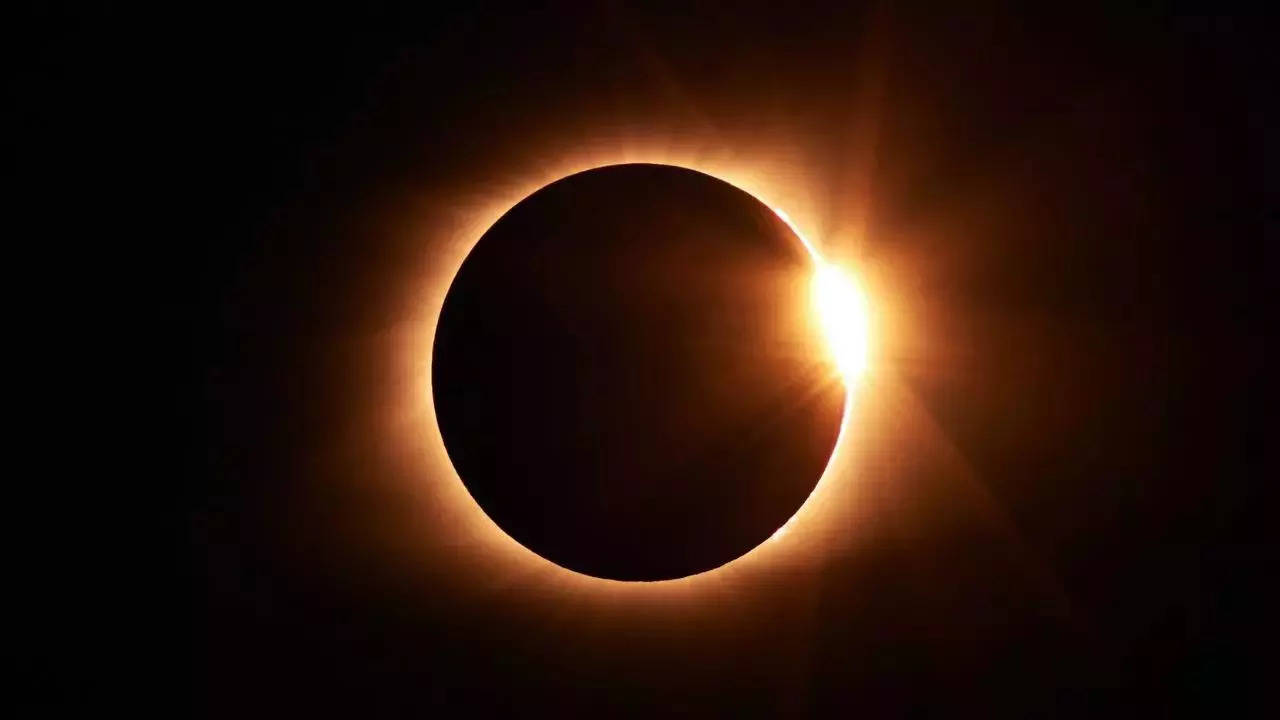NEW DELHI: On Monday, April 8, most of North America will have the chance to see the Moon pass in front of the Sun during a solar eclipse. Nasa is inviting the public to participate with in-person events, opportunities to do Nasa science, and multiple ways to watch online.
Millions of people along the path of totality – which stretches from Texas to Maine in the United States – will see a total solar eclipse, when the Moon completely covers the Sun.Outside the path of totality, people across the contiguous United States will have a chance to see a partial solar eclipse, when the Moon covers part of the Sun.
Watch through eyes of Nasa
Nasa will host live coverage of the eclipse starting at 1 p.m. EDT. The agency’s eclipse coverage will include live views of the eclipse from across North America, special appearances by Nasa experts, astronauts aboard the space station, and an inside look at Nasa’s eclipse science experiments and watch parties across the country. Nasa’s broadcast will last three hours and feature live locations from across the nation including Nasa’s Glenn Research Center in Ohio, as well as Carbondale, Illinois; Dallas; Houlton, Maine; Indianapolis; Kerrville, Texas; Niagara Falls, New York; and Russellville, Arkansas.
The Nasa broadcast will stream on Nasa+, air on Nasa TV, and the agency’s website. Nasa will also host a watch party of the eclipse in Spanish starting at 1:30pm on YouTube.
Nasa will provide a no-commentary, telescope-only feed of the eclipse on Nasa Television’s media channel and YouTube, starting at 1 p.m. and running for three hours. The telescope feed will incorporate views from multiple locations, and will be switched based on weather, the eclipse’s progress, and feed availability. Locations may include Carbondale, Illinois; Cleveland; Dallas; Houlton, Maine; Indianapolis; Junction, Texas; Kerrville, Texas; Mazatlán, Mexico; Niagara Falls, New York; Russellville, Arkansas; Torreón, Mexico; and Tupper Lake, New York.
Nasa’s Wallops Flight Facility in Virginia will provide a commentated livestream of three sounding rocket launches for the Atmospheric Perturbations around Eclipse Path mission. The livestream will begin at 2:30 p.m. on Nasa Wallops’ YouTube channel and conclude after the last of the three sounding rocket launches.
Nasa’s interactive Eclipse Explorer Map will allow users to track the total solar eclipse in real time on April 8 as it moves across North America. Use the tool ahead of time to search by zip code or city for eclipse timing, get real-time weather updates, percent of eclipse coverage, and even a corona prediction for locations in the path of totality.
Media resources are available on Nasa’s eclipse website.
Details about in-person eclipse events and registration requirements for media are available online.
Nasa eclipse photos will be shared on the Flickr account.
Millions of people along the path of totality – which stretches from Texas to Maine in the United States – will see a total solar eclipse, when the Moon completely covers the Sun.Outside the path of totality, people across the contiguous United States will have a chance to see a partial solar eclipse, when the Moon covers part of the Sun.
Watch through eyes of Nasa
Nasa will host live coverage of the eclipse starting at 1 p.m. EDT. The agency’s eclipse coverage will include live views of the eclipse from across North America, special appearances by Nasa experts, astronauts aboard the space station, and an inside look at Nasa’s eclipse science experiments and watch parties across the country. Nasa’s broadcast will last three hours and feature live locations from across the nation including Nasa’s Glenn Research Center in Ohio, as well as Carbondale, Illinois; Dallas; Houlton, Maine; Indianapolis; Kerrville, Texas; Niagara Falls, New York; and Russellville, Arkansas.
The Nasa broadcast will stream on Nasa+, air on Nasa TV, and the agency’s website. Nasa will also host a watch party of the eclipse in Spanish starting at 1:30pm on YouTube.
Nasa will provide a no-commentary, telescope-only feed of the eclipse on Nasa Television’s media channel and YouTube, starting at 1 p.m. and running for three hours. The telescope feed will incorporate views from multiple locations, and will be switched based on weather, the eclipse’s progress, and feed availability. Locations may include Carbondale, Illinois; Cleveland; Dallas; Houlton, Maine; Indianapolis; Junction, Texas; Kerrville, Texas; Mazatlán, Mexico; Niagara Falls, New York; Russellville, Arkansas; Torreón, Mexico; and Tupper Lake, New York.
Nasa’s Wallops Flight Facility in Virginia will provide a commentated livestream of three sounding rocket launches for the Atmospheric Perturbations around Eclipse Path mission. The livestream will begin at 2:30 p.m. on Nasa Wallops’ YouTube channel and conclude after the last of the three sounding rocket launches.
Nasa’s interactive Eclipse Explorer Map will allow users to track the total solar eclipse in real time on April 8 as it moves across North America. Use the tool ahead of time to search by zip code or city for eclipse timing, get real-time weather updates, percent of eclipse coverage, and even a corona prediction for locations in the path of totality.
Media resources are available on Nasa’s eclipse website.
Details about in-person eclipse events and registration requirements for media are available online.
Nasa eclipse photos will be shared on the Flickr account.
Denial of responsibility! Swift Telecast is an automatic aggregator of the all world’s media. In each content, the hyperlink to the primary source is specified. All trademarks belong to their rightful owners, all materials to their authors. If you are the owner of the content and do not want us to publish your materials, please contact us by email – swifttelecast.com. The content will be deleted within 24 hours.


